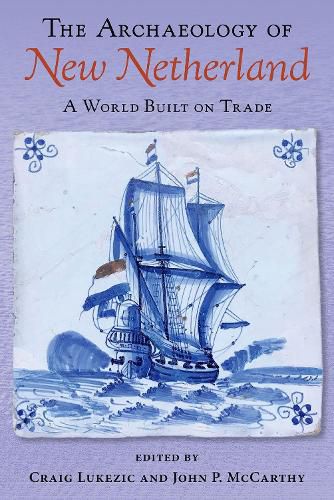Readings Newsletter
Become a Readings Member to make your shopping experience even easier.
Sign in or sign up for free!
You’re not far away from qualifying for FREE standard shipping within Australia
You’ve qualified for FREE standard shipping within Australia
The cart is loading…






This title is printed to order. This book may have been self-published. If so, we cannot guarantee the quality of the content. In the main most books will have gone through the editing process however some may not. We therefore suggest that you be aware of this before ordering this book. If in doubt check either the author or publisher’s details as we are unable to accept any returns unless they are faulty. Please contact us if you have any questions.
The Archaeology of New Netherland illuminates the influence of the Dutch empire in North America, assembling evidence from seventeenth-century settlements located in present-day New York, New Jersey, Connecticut, Pennsylvania, and Delaware. Archaeological data from this important early colony has often been overlooked because it lies underneath major urban and industrial regions, and this collection makes a wealth of information widely available for the first time.Contributors to this volume begin by discussing the global context of Dutch colonization and reviewing typical Dutch material culture of the time as seen in ceramics from Amsterdam households. Next, they focus on communities and activities at colonial sites such as forts, trading stations, drinking houses, and farms. The essays examine the agency and impact of Indigenous people and enslaved Africans, particularly women, in the society of New Netherland, and they trace interactions between Dutch settlers and Europeans from other colonies including New Sweden. The volume also features landmark studies of cooking pots, marbles, tobacco pipes, and other artifacts.
The research in this volume offers an invitation to investigate New Netherland with the same sustained rigor that archaeologists and historians have shown for English colonialism. The many topics outlined here will serve as starting points for further work on early Dutch expansion in America.
$9.00 standard shipping within Australia
FREE standard shipping within Australia for orders over $100.00
Express & International shipping calculated at checkout
This title is printed to order. This book may have been self-published. If so, we cannot guarantee the quality of the content. In the main most books will have gone through the editing process however some may not. We therefore suggest that you be aware of this before ordering this book. If in doubt check either the author or publisher’s details as we are unable to accept any returns unless they are faulty. Please contact us if you have any questions.
The Archaeology of New Netherland illuminates the influence of the Dutch empire in North America, assembling evidence from seventeenth-century settlements located in present-day New York, New Jersey, Connecticut, Pennsylvania, and Delaware. Archaeological data from this important early colony has often been overlooked because it lies underneath major urban and industrial regions, and this collection makes a wealth of information widely available for the first time.Contributors to this volume begin by discussing the global context of Dutch colonization and reviewing typical Dutch material culture of the time as seen in ceramics from Amsterdam households. Next, they focus on communities and activities at colonial sites such as forts, trading stations, drinking houses, and farms. The essays examine the agency and impact of Indigenous people and enslaved Africans, particularly women, in the society of New Netherland, and they trace interactions between Dutch settlers and Europeans from other colonies including New Sweden. The volume also features landmark studies of cooking pots, marbles, tobacco pipes, and other artifacts.
The research in this volume offers an invitation to investigate New Netherland with the same sustained rigor that archaeologists and historians have shown for English colonialism. The many topics outlined here will serve as starting points for further work on early Dutch expansion in America.